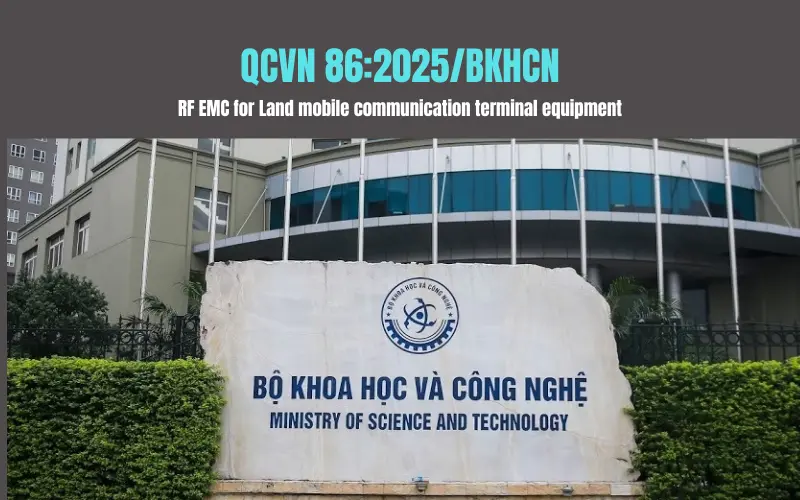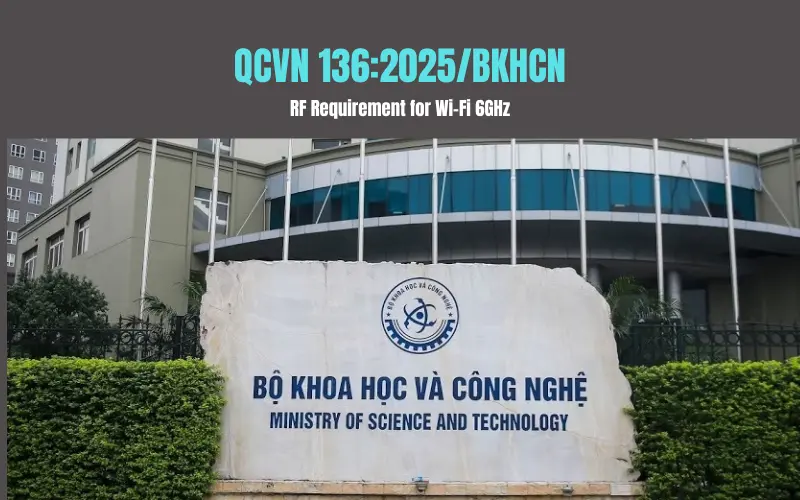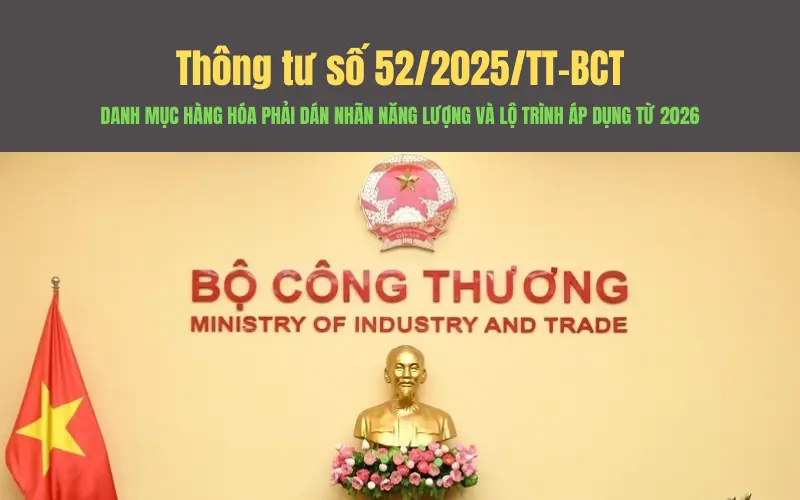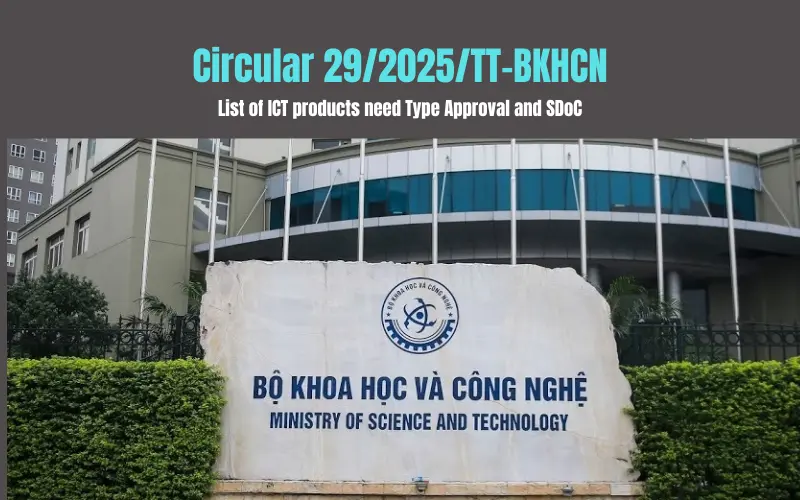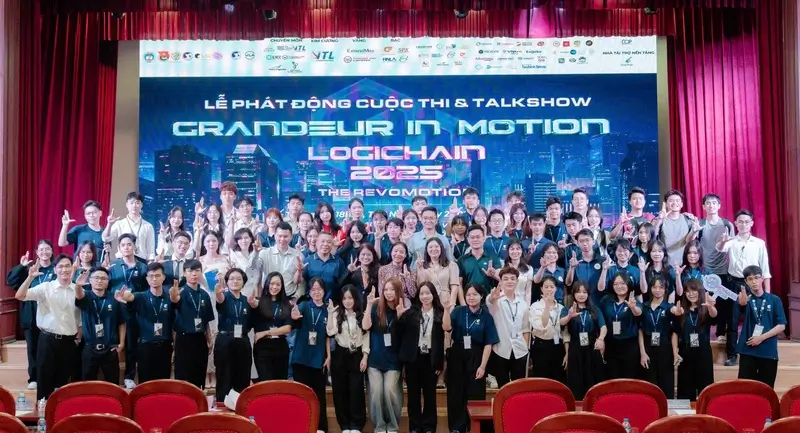Law on Product and Goods Quality 2025: Revised from the core
From 2026, the category of group 2 goods will be abolished. The new Law on Product and Goods Quality 2025 applies a modern and flexible 3-level risk model.
The Law on Product and Goods Quality amended and supplemented in 2025 is not only a simple technical update, but an important turning point in the approach to quality management in Vietnam. For the first time, the legal system on quality has transformed from a "risk group" management model – which is static, to a management framework based on multi-level risk assessment, in line with international practices such as WTO/TBT and ISO 31000 standards.
The core definition of "product" and "commodity" has been restructured, expanding the scope of regulation to include intangible products such as software, digital services, and AI – reflecting the reality of the modern market. The risk assessment criteria are based not only on the physical nature of the product, but also on supply chain control, warnings from international organizations, and also the degree of suitability for actual use. In particular, Law 2025 is the first time to legislate new concepts such as product digital passports, electronic labels, and smart traceability, and at the same time requires businesses to integrate a system to receive real-time feedback and risk warnings. It is not just a monitoring tool – it is the foundation of a transparent, modern and consumer-oriented quality ecosystem.
With a focus on digital transformation, risk management and international harmonization, the amended Law on Product and Goods Quality in 2025 sets new requirements for businesses, but at the same time opens up great opportunities to improve competitiveness, build market trust and deeply integrate into the global value chain. In the article below, ExtendMax will analyze the new points of the law and its impact on readers
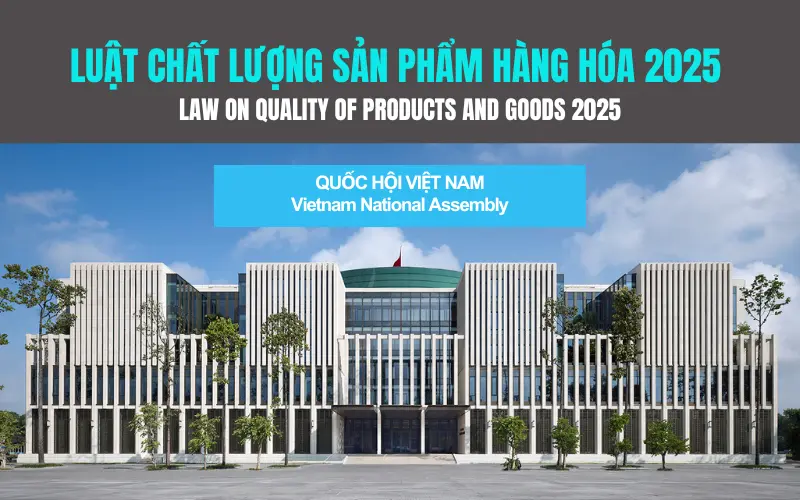
1. Change from the core: Redefining "product" and "commodity"
One of the most fundamental and sophisticated changes in the 2025 Amendment Law is the redefinition of the concepts of "product" and "commodity" – which are the two central terms of the entire legal system related to quality. These adjustments are not merely language, but reflect a step forward in legal thinking, allowing to expand the scope of regulation, ensuring inclusiveness and flexibility for the future.
| Definition | Law 2007 (amended 2018) | Amended Law 2025 | Meaning and impact |
|---|---|---|---|
| Product | "A product is the result of the production or provision of services for business or consumption purposes" | "Products are the outputs of manufacturing, manufacturing, or non-existent outputs generated from service activities." | Clarifying the limits of "products" is not only tangible – this allows for quality management of services, digital products (e.g., software, AI, cloud services, etc.). |
| Commodities | "Goods are products that are put on the market and consumed through exchange, sale, and marketing." | "Goods are products put into circulation on the market, serving consumption, use or business purposes" | Focus more on the circulation life cycle, paving the way for new forms of distribution such as e-commerce, digital business, leasing, sharing, etc. |
Impact Implications
-
For service and digital technology enterprises: The new law clearly recognizes non-material products, which means that businesses developing software, online services, and technology platforms will now be more clearly regulated in the legal framework on information quality and security, etc. traceability, etc.
-
For modern business models: Models such as software-as-a-service (SaaS), commercial AI applications, digital services that integrate devices, will clearly be considered products/goods if they are put on the market. This forces businesses to publish technical standards, ensure output quality, and be responsible if they cause damage to users.
-
For state managers: Regulators need to upgrade monitoring tools to keep up with "non-material products" such as software, data, and electronic services – which are very different from the traditional physical inspection model. This promotes digital transformation in quality management and building a smart legal platform.
>>> See more: Revised Law on Standards and Technical Regulations 2025: Extensive reform
2. From 2026, there will be no more "group 2 product list"
In the Law on Product Quality 2007 (amended in 2018), products and goods are classified into 2 groups:
-
Group 1 commodity products: "safe" products – not likely to cause unsafety under reasonable use conditions.
-
Group 2 commodity products: products that are "potentially unsafe" – can still be unsafe even if used correctly.
This approach is easy to implement but lacks flexibility, because:
-
Only based on the criterion of the ability to cause insecurity in nature, not taking into account volatile factors such as the use environment, changes in technology, supply chain.
-
There is no distinction between group 2 products with different levels of risk (e.g., pressure cooker vs. electronic medical device, which device is more unsafe).
-
It is difficult to adapt to the rapid emergence of new products, new technologies, and hybrid products.
The amended Law on Product and Goods Quality in 2025 has shifted from the method of classifying products according to "risk groups" to a comprehensive and multi-dimensional risk assessment model. Accordingly, products and goods will be classified into three levels of risk: low risk, medium risk and high risk. This new approach reflects the trend towards modernizing quality management – instead of statically labeling risks, the new legal system allows risk assessment to be based on data, usage context, and up-to-date over time.
Article 5 of the amended Law has specified criteria for assessing the level of risk of products, including: the level of impact on human health and the environment; the ability to control the entire supply chain; warning information and reports from reputable international organizations; and the suitability of the product for its intended use. This assessment is not only based on the physical characteristics of the product, but also extends to operational factors and usage context – thereby, creating a management mechanism that is both tight and adapts to the constant fluctuations of the market and technology.
3. Some other breakthroughs in the Law on Product Quality 2025
-
Enhanced traceability and quality transparency: For the first time, concepts such as traceability, product digital passports, e-labels, and quality information management are codified through digital platforms. Supply chain transparency not only helps state agencies control effectively but also supports businesses to build trust with consumers.
-
Harmonization with international law and digitization of quality management: Law 2025 clearly mentions the mutual recognition of the results of conformity assessments with other countries, facilitating trade. At the same time, the law also emphasizes the use of digital technology, artificial intelligence (AI), and big data (Big Data) to monitor quality, warn early and handle violations.
-
Improving corporate responsibility and interests: Organizations and individuals producing, importing and exporting are now not only required to publish standards but also have the obligation to operate the system to receive feedback, compensate for damages, update quality data, and coordinate traceability when requested by the authorities.
>>> See more: ICT Conformity Compliance Strategy: 2025–2026
Analysis of some key points in the Law on CLSPHH 2007 and the Law on CLSPHH 2025
| Content | Law 2007 (amended 2018) | Amended Law 2025 | In-depth analysis |
|---|---|---|---|
| Quality Management Model | Classification of products by group 1 – group 2 based on unsafe potential | Classification according to 3 risk levels: low, medium, high | The group 1–2 model lacks flexibility and does not adequately reflect risk throughout the entire product lifecycle. The multi-level risk model allows for the construction of a focused management portfolio, flexible updates by industry, and international alerts. |
| Concept of risk and level of risk | Not mentioned | Clear definition, details of what risk is, how to define risk, extent and consequences | This is a fundamental change, bringing Vietnam's quality management to ISO 31000 on risk management. This allows businesses to self-evaluate and categorize products from the R&D stage. |
| Traceability & Transparency | Optional, no specific regulations | Required for high-risk products; Encourage Expansion of Application | Increase transparency and combat trade fraud, especially in the context of e-commerce and explosive digital consumption. Tools such as QR codes and blockchain will play an important role. |
| Passport Product Number | No concept | For the first time, it is regulated and stores information about products throughout the supply chain | Contributing to creating a national database on product quality, convenient for inspection, tracing, and supporting smart consumption. |
| Corporate Responsibility | Compliance and labeling | Must operate a system of feedback, risk warning, data retention, and management coordination | Increase obligations but at the same time increase the initiative and the right to receive support from the State, creating a comprehensive quality governance model. |
| Support Policy | As a general incentive | Concretize policies to support SMEs: testing, certification, traceability, promotion of award-winning products | Associated with the National Program on Improving Productivity and Quality, providing substantive support for small and medium-sized enterprises to access domestic and foreign markets. There is a state program to support all costs of testing and certification of conformity |
| Technology and digital transformation | No emphasis | Mandatory use of digital technology in quality monitoring, warning, data storage | In line with the National Strategy on Digital Transformation, create a synchronous data platform for timely analysis, inspection, and policy adjustment. |
Full text of the Law on Product and Goods Quality amended 2025
(Version approved by the National Assembly on 18/06/2025)
| CONGRESS Law No. /2025/QH15 | SOCIALIST REPUBLIC OF VIETNAM Independence - Freedom - Happiness
|
| Draft Law to be submitted to the National Assembly for approval |
LAW
AMENDING AND SUPPLEMENTING A NUMBER OF ARTICLES
OF THE LAW ON PRODUCT AND GOODS QUALITY
Pursuant to the Constitution of the Socialist Republic of Vietnam;
The National Assembly promulgates the Law amending and supplementing a number of articles of the Law on Product and Goods Quality No. 05/2007/QH12, which has been amended and supplemented by Law No. 35/2018/QH14.
Article 1. Amending and supplementing a number of articles of the Law on Product and Goods Quality
1. To amend and supplement Articles 1, 2, 3, 4, 5 and 6; Articles 6a, 6b, 6c, 6d, 6dd are added after Article 6 as follows:
"Article 1. Scope of adjustment
This Law prescribes measures to manage the quality of products and goods; rights and obligations of organizations and individuals producing and trading products and goods and other organizations and individuals engaged in activities related to product and goods quality.
Article 2. Subjects of application
This Law applies to organizations and individuals producing and trading products and goods and other organizations and individuals engaged in activities related to product and goods quality in Vietnam.
Article 3. Interpretation of terms
In this Law, the following terms shall be construed as follows:
1. Product means the output of the manufacturing or production process or the output that does not exist in material form generated from service activities.
2. Goods are products that are put into circulation on the market for consumption, use or business purposes.
3. Product and goods quality means the sum of characteristics of products and goods that meet the requirements of corresponding standards and technical regulations or management requirements in accordance with relevant laws.
4. Product and goods quality management means the organization and implementation of measures to control the compliance with requirements of standards, technical regulations or management requirements in accordance with relevant laws.
5. Risks of products and goods are the possibility of unexpected events during the production, transportation, storage, preservation and use of products and goods that may negatively affect the quality, safety or suitability of products, goods, thereby affecting the legitimate interests of consumers, businesses and stakeholders.
6. Risk level of a product or goods means the possibility of occurrence of risks related to the product or goods during its entire life cycle, determined by the combination of consequences when the product or goods do not conform to the announced standards or corresponding technical regulations or the suitability for the purpose of use and the possibility of occurrence risks in practice.
7. Inspection of product and goods quality means the consideration and assessment of the quality of products and goods by competent state agencies in the process of production, export, import and circulation on the market.
8. A digital passport of a product is a collection of information about a product and its supply chain, stored by a barcode or appropriate methods or through an information database by a path, ensuring that it can be read or connected through an appropriate device.
Article 4. Application of law
Production, export, import and circulation on the market related to the quality of products and goods must comply with the provisions of this Law. In case the relevant law provides for other provisions on quality management, the provisions of that law and the principles specified at Points a, b and dd, Clause 4, Article 5 of this Law shall apply.
Article 5. Principles of quality management and management of products and goods
1. Products and goods are classified based on the level of risk, in accordance with international practices; warnings of relevant international organizations for products and goods; management capacity of state agencies in each period.
2. Products and goods are classified into the following three categories:
a) Products and goods with a low level of risk;
b) Products and goods with an average level of risk;
c) Products and goods with a high level of risk.
3. Risk assessment criteria include the level of impact on health, the environment, the ability to control the supply chain and warnings from international organizations.
4. Quality management of products and goods shall comply with the following principles:
a) The management of products and goods must ensure efficiency, publicity, transparency, objectivity, and conformity with the level of risk; do not discriminate on the origin of goods and related subjects, conform to international practices, and do not create unnecessary technical barriers; protect the rights of the State, the legitimate rights and interests of enterprises and consumers ;
b) Products and goods with low risk levels must be self-announced by organizations and individuals to apply standards;
c) Products and goods with an average level of risk must be self-announced by organizations and individuals to apply standards; must be self-assessed or certified by a recognized certification organization for conformity with the corresponding national technical regulations in accordance with the law on standards and technical regulations;
d) Products and goods with a high level of risk must be self-announced by organizations and individuals to apply standards and certified by the designated certification organization to certify conformity with the corresponding national technical regulations in accordance with the law on standards and technical regulations;
dd) Productsand goods with medium and high risk levels must be managed according to the list associated with the corresponding quality control requirements, clearly identifying products and goods eligible for other management measures in accordance with relevant laws.
5. The Government shall detail this Article.
Article 6. The State's policies on activities related to product and goods quality
1. Organizations and individuals are encouraged to formulate and apply advanced standards for products and goods and the management and administration of production, export, import and circulation on the market; create conditions for domestic and foreign organizations and individuals to invest in and participate in conformity assessment activities.
2. To formulate a national program to improve the productivity, quality and competitiveness of products and goods; support to improve the capacity of small and medium-sized enterprises in national quality infrastructure.
3. To invest in and develop national quality infrastructure to meet the requirements of production, export, import and circulation on the market and the state management of product and goods quality.
4. To propagate and disseminate policies and laws on product and goods quality; diversify and innovate methods of propagation, build awareness of production, export, import and circulation of quality products and goods, for the benefit of consumers, energy saving and environmental friendliness; raise social awareness of consumption, build civilized consumption practices, sustainable development; propagating the role of the Prize in the promotion ofthe number of people.
5. To promote international cooperation on product and goods quality in order to expand export markets; prioritize signing and encouraging mutual recognition of conformity assessment results between Vietnam and international partners, do not create unnecessary technical barriers, save compliance costs and facilitate trade for Vietnamese goods on the international market.
6. To encourage and support enterprises to apply traceability systems and digital technology to provide transparency of information on origin, production processes, supply chains and product quality; to develop a supply chain certification mechanism that can be independently and objectively authenticated, in accordance with international practices to improve quality transparency, traceability and prevent trade fraud.
Article 6a. Responsibility for state management of product and goods quality
1. The Government shall perform the unified state management of product and goods quality nationwide.
2. The Ministry of Science and Technology shall be the focal agency responsible to the Government for performing the unified state management of product and goods quality under the provisions of this Law.
3. Ministries and ministerial-level agencies shall, within the ambit of their assigned tasks and powers, perform the state management of product and goods quality.
The Minister of National Defense and the Minister of Public Security shall specify the implementation of the state management of the quality of products and goods under their management in accordance with the requirements and tasks of ensuring national defense and security after discussing and reaching agreement with the Minister of Science and Technology.
The Minister of National Defense shall perform the state management of product and goods quality for specific subjects in the cipher sector.
4. People's Committees at all levels shall perform the state management of product and goods quality in their localities.
5. The Government shall detail this Article.
Article 6b. National quality infrastructure
1. National quality infrastructure is a constituent part of socio-economic infrastructure, including organizations operating in the field of standards, measurement, conformity assessment, recognition and relevant policies and regulations on standards, metrology and quality contributes to improving national competitiveness in association with the orientation of sustainable development and digital transformation.
2. To develop national quality infrastructure in the direction of concentration, unity, modernity and international integration, based on digital technology, ensuring the following requirements:
a) Uniformly and synchronously carry out standardization, measurement, conformity assessment and quality inspection from the central to local levels;
b) Connect, share and effectively exploit resources for the development of national quality infrastructure according to the roadmap and be periodically assessed and reported. The sharing of data is carried out periodically and irregularly, ensuring fullness, timeliness and accuracy to serve the inspection, warning and quality management nationwide;
c) Develop organizations, networks of experts and human resources in terms of standards, measurement and assessment of conformity at regional and international levels;
d) Apply new technologies, build digital platforms in conformity assessment, promote mutual recognition and recognition of conformity assessment results between Vietnam and the world;
dd) To build a national product and goods quality supervision system to help enterprises be transparent about product and goods quality, management agencies to actively supervise and inspect and people to participate in providing information on product and goods quality;
e) Strengthen international integration in conformity assessment, fully participate in regional and international recognition forums and programs to support exports and expand markets.
3. The State shall invest in and mobilize domestic and international resources to build national quality infrastructure, develop strategic technological industrial products, products with new characteristics, export products and high-tech products, and improve the capacity of Vietnamese enterprises to participate in the global supply chain.
4. The State shall prioritize the allocation of the state budget and mobilize resources to build a national product and goods quality supervision system, link customs data, quality inspection, traceability information, reports from consumers and international warnings; ensure the monitoring capacity, early warning and timely prevention of products and goods that do not conform to the announced standards and corresponding technical regulations.
5. The Government shall detail this Article.
Article 6c. Support for improving the capacity of enterprises in the national quality level
1. To honor and reward organizations, enterprises, state agencies and individuals with outstanding achievements in improving the quality of products and goods; to honor products and goods through product and goods quality awards.
2. Product and goods quality awards are prescribed as follows:
a) Product and goods quality awards, including national quality awards and product and goods quality awards of organizations and individuals;
b) Conditions, criteria and procedures for consideration and awarding of the National Quality Award prescribed by the Government;
c) Conditions, criteria and procedures for consideration and awarding of product and goods quality awards of organizations and individuals shall be prescribed by the Minister of Science and Technology.
3. To support organizations and enterprises in winning the National Quality Award in accordance with law with the following contents:
a) Financial support from the state budget through funding programs for research, development of products, technologies and improvement of product quality;
b) Creating conditions for participation in international cooperation programs in order to expand export markets and enhance national brand value;
c) Support the training and development of human resources in standards, measurement and assessment of conformity;
d) Supporting the building and development of national brands, through the promotion of award-winning products, helping to increase domestic and foreign market share;
dd) Support in the development of environmentally friendly products, green technologies and energy-saving solutions in the production process.
4. To support organizations and small and medium-sized enterprises under the National Program on Productivity and Quality Improvement in accordance with law with the following contents:
a) Apply basic and specific quality productivity improvement management systems and tools according to sectors and fields; new management system standards; traceability system, good agricultural practices, organic agriculture, green productivity and smart production;
b) Consultancy, formulation and application of international standards; testing, assessment and certification of product and goods quality according to international standards; consultancy, testing and certification of international standards in the form of non-refundable funding.
5. The State shall pay part or all of the testing costs for the country's key export products conducted by testing organizations meeting international standards; support the expenses for certification of standard and regulation conformity appointed by state agencies in accordance with law.
6. The State shall support the provision of information on international and regional standards, connect with international standards organizations, promote mutual recognition of standards and results of conformity assessment to facilitate trade. The State shall create conditions for enterprises to participate in reviewing, giving suggestions, amending or formulating standards for production and export, especially for sectors and fields that do not yet have standards or apply new technologies.
7. The Government shall detail this Article.
Article 6d. Traceability and transparency of the supply chain of products and goods
1. The traceability and transparency of the supply chain of products and goods must be carried out on the principles of honesty and objectivity, ensuring authenticity and verifiability, not obstructing the circulation of goods and being consistent with the provisions of the law on customs, trade, taxation and trade remedies and other relevant laws; support competent agencies in verifying the origin, production process, composition and quality of products and goods in accordance with law.
2. For products and goods with a high level of risk, traceability is compulsory to be determined by ministries and ministerial-level agencies and have a roadmap for implementation, ensuring feasibility, conformity with the capacity of enterprises and development characteristics of each commodity line.
3. Organizations and individuals producing, exporting, importing and circulating products and goods are encouraged and supported to implement traceability, in accordance with the scale, characteristics of goods lines and production and business conditions.
Article 6dd. Application of technology in quality management of products and goods
1. Apply technology in product and goods quality management to ensure information transparency, traceability, connection and data sharing throughout the entire life cycle of products and goods, in line with the requirements of development of the digital economy, circular economy and international integration.
2. To encourage the application of technology in activities of standardization, measurement, conformity assessment, quality inspection and supervision and management of product and goods information, including:
a) Supply chain management through codes, barcodes, traceability, e-labels and digital platforms;
b) Collecting, storing and analyzing data in service of post-circulation examination and examination on the market, inspection, warning and handling of violations;
c) Apply digital passports of products, e-labels and information on traceability of products and goods in accordance with law and guidance of competent agencies;
d) Application of artificial intelligence, big data and advanced digital technology in standardization, measurement, conformity assessment, inspection, quality supervision and management of product and goods information.
3. The State shall adopt policies to promote the application of technology and digital transformation in the quality management of products and goods; encourage organizations and individuals to invest in material foundations, data infrastructure and develop human resources for the activities specified in this Article.
4. The application of digital technology, electronic labels, codes, barcodes and traceability systems must ensure data safety and security in the entire process of data collection, storage, processing and sharing; must comply with the principles of information security, privacy and data protection in accordance with the law.
5. The Government shall detail this Article.".
2. To amend and supplement a number of clauses of Article 8 as follows:
a) Clauses 9 and 10 are amended as follows:
"9. Providing false information and advertising or committing fraudulent acts about the quality, origin and origin of products and goods; trading in products and goods that are not in accordance with the announced and applied standards, corresponding technical regulations, unknown origin, origin, especially on digital platforms for electronic transactions, causing confusion or deceiving consumers.
10. Concealing information about the level of risk of products and goods that may affect human health, safety of animals, plants, property or the environment.";
b) Clause 14 is added after Clause 13 as follows:
"14. Committing acts of unfair competition related to the quality of products and goods, causing confusion and damage to other organizations and individuals.".
3. To amend and supplement the name of Article and a number of clauses of Article 9 as follows:
a) To amend and supplement the title of Article as follows:
"Article 9. Rights of production organizations and individuals";
b) Clause 3 is amended as follows:
"3. Selection of conformity assessment organizations to carry out conformity assessment of standards and technical regulations.";
c) Clause 5 is amended as follows:
"5. To request the goods seller to cooperate in the recall and handling of goods that are not in conformity with the announced applicable standards and corresponding technical regulations.";
d) Clause 7 is amended as follows:
"7. To be compensated for damage according to the provisions of Section 2, Chapter V of this Law and other relevant provisions of law.";
dd) Clauses 8 and 9 are added after Clause 7 as follows:
"8. To have access to information, guidance, technical, financial support and preferential policies of the State related to standards, technical regulations, conformity assessment and quality management of products and goods.
9. Apply traceability solutions to products and goods in accordance with law.".
4. To amend and supplement the name of Article and a number of clauses of Article 10 as follows:
a) To amend and supplement the title of Article as follows:
"Article 10. Obligations of production organizations and individuals";
b) Clause 1 is amended as follows:
"1. Comply with the quality assurance conditions for products before they are circulated on the market as prescribed in Article 28 of this Law and take responsibility for the quality of products they produce.";
c) Clause 4 is amended as follows:
"4. Warning about the level of risk of the product and how to prevent it for organizations, individuals selling and consumers.";
d) Clause 7 is amended as follows:
"7. Repair, exchange or recall defective products and goods and return money to consumers in accordance with the law on protection of consumer rights.";
dd) Clause 8 is amended as follows:
"8. Promptly stop production, notify relevant parties and take remedial measures when detecting products and goods that are not in conformity with the announced standards and corresponding technical regulations.";
e) Clause 10 is amended as follows:
"10. Compensation for damage shall comply with the provisions of Section 2, Chapter V of this Law and other relevant laws.";
g) Clause 12 is amended as follows:
"12. To pay expenses for testing, certification of standard conformity and certification of technical-regulation conformity as prescribed in Article 23a of this Law; expenses for sampling and testing as prescribed in Article 47 of this Law; expenses for sampling, testing and assessment as prescribed in Article 58 of this Law.";
h) Clauses 14, 15 and 16 are added after Clause 13 as follows:
"14. Update and provide information on the quality of products and goods in accordance with the provisions of law or at the request of competent agencies.
15. To establish and operate a system for receiving information and compensation when products fail to meet the quality and cause harm to consumers, in accordance with the scale and operating conditions; ensure convenient access, fair and timely settlement.
16. To keep dossiers and provide information on quality and conformity assessment results at the request of competent agencies.".
5. To amend and supplement the name of Article and a number of clauses of Article 11 as follows:
a) To amend and supplement the title of Article as follows:
"Article 11. Rights of importing organizations and individuals";
b) Clauses 2 and 3 are amended as follows:
"2. Requesting exporting organizations and individuals to supply goods of the same quality as agreed upon under the contract.
3. To select conformity assessment organizations to assess the conformity with standards and technical regulations for goods imported by them.";
c) Clause 6 is amended as follows:
"6. To request the goods seller to cooperate in the recall and handling of goods that are not in conformity with the announced applicable standards and corresponding technical regulations.";
d) Clause 8 is amended as follows:
"8. To be compensated for damage according to the provisions of Section 2, Chapter V of this Law and other relevant laws.";
dd) Clauses 9 and 10 are added after Clause 8 as follows:
"9. To have access to information, guidance, technical assistance and preferential policies of the State related to import activities, conformity assessment, labeling of goods and compliance with regulations on product and goods quality.
10. To be provided with or look up information on the traceability of products and goods imported by them through the database provided by the exporting country or the conformity assessment organization, in order to serve the requirements of publicity, transparency and quality supervision.".
6. To amend and supplement the name of Article and a number of clauses of Article 12 as follows:
a) To amend and supplement the title of Article as follows:
"Article 12. Obligations of importing organizations and individuals";
b) Clauses 2 and 3 are amended as follows:
"2. To take responsibility for the quality, labeling of goods and keep import dossiers in accordance with law for goods imported by them; fully and accurately provide quality-related documents to organizations and individuals selling goods in accordance with law to serve traceability, market supervision and protection of consumer interests.
3. Truthful information on the quality and origin of products and goods.";
c) Clauses 6, 7, 8 and 9 are amended as follows:
"6. To warn about the level of risk of products and goods and how to prevent them for organizations and individuals selling goods and consumers.
7. To provide information on the warranty and implementation of the warranty of goods to organizations and individuals selling goods and consumers.
8. Repair, exchange or recall defective products and goods and return money to consumers in accordance with the law on protection of consumer rights.
9. Promptly stop importing, notify relevant parties and take remedial measures when detecting goods that are not in conformity with the announced applicable standards and corresponding technical regulations.";
d) Clause 11 is amended as follows:
"11. Destroying, recycling or changing the use purpose of imported goods that do not conform to the corresponding technical regulations but cannot be re-exported; bear all expenses for the destruction, recycling or change of use purpose of goods and take responsibility for the consequences of the destruction, recycling or change of use purpose of goods in accordance with law.";
dd) Clause 13 is amended as follows:
"13. Compensation for damage shall comply with the provisions of Section 2, Chapter V of this Law and other relevant laws.";
e) Clause 15 is amended and supplemented; Clauses 16, 17 and 18 are added after Clause 15 as follows:
"15. To pay the cost of sampling and testing as prescribed in Article 47 of this Law; expenses for sampling, testing and assessment shall comply with the provisions of Article 58 of this Law.
16. To coordinate with competent state agencies in risk assessment, supervision and early warning of imported goods with medium and high risk levels that do not conform to technical regulations or violate regulations on protection of consumer rights.
17. To publicize contact information and the system for receiving feedback on the quality of imported goods; coordinate in settling complaints and disputes arising related to the quality of imported goods.
18. To establish and operate a system for receiving information and compensation when products do not conform to the announced and applied standards and corresponding technical regulations, causing harm to consumers, in accordance with the scale and operating conditions; ensuring convenient access and fair settlement, in time.".
7. To amend and supplement the name of Article and a number of clauses of Article 13 as follows:
a) To amend and supplement the title of Article as follows:
"Article 13. Rights of exporting organizations and individuals";
b) Clause 7 is amended as follows:
"7. To be compensated for damage according to the provisions of Section 2, Chapter V of this Law and other relevant laws.";
c) Clause 8 and Clause 9 are added after Clause 7 as follows:
"8. To have access to information, guidance, technical, financial support and preferential policies of the State related to standards, conformity assessment, traceability and quality conditions of exported goods.
9. To use the conformity assessment results of domestic or foreign organizations in case these results have been recognized or mutually recognized under international treaties and agreements to which Vietnam is a contracting party in accordance with the law on standards and technical regulations.".
8. To amend and supplement the name of Article and a number of clauses of Article 14 as follows:
a) To amend and supplement the title of Article as follows:
"Article 14. Obligations of exporting organizations and individuals";
b) Clause 4 is amended and supplemented; Clauses 5, 6, 7 and 8 are added after Clause 4 as follows:
"4. Pay expenses for testing, certification of standard conformity and certification of technical-regulation conformity as prescribed in Article 23a of this Law, expenses for sampling and testing as prescribed in Article 47 of this Law and expenses for sampling, testing and assessment as prescribed in Article 58 of this Law.
5. To provide sufficient and truthful information on the standards of application and traceability of goods to importing organizations and individuals in case the competent agencies in the importing country's market so request them in accordance with the law of the importing country.
6. To comply with the provisions of law of the importing country, trade contracts or relevant treaties to which the Socialist Republic of Vietnam is a contracting party.
7. Organize the traceability of exported goods at the request of the importing country.".
9. To amend and supplement the name of Article and a number of clauses of Article 15 as follows:
a) To amend and supplement the title of Article as follows:
"Article 15. Rights of organizations and individuals selling goods";
b) Clause 6 is amended as follows:
"6. To be compensated for damage according to the provisions of Section 2, Chapter V of this Law and other relevant laws.";
c) Clauses 7 and 8 are added after Clause 6 as follows:
"7. To access and access information on traceability and quality data of products and goods from organizations and individuals producing and importing or electronic information systems in accordance with law in service of sales and provision of transparent information to consumers.
8. To receive technical guidance and support from organizations and individuals producing and importing in inspecting, preserving, transporting, providing information and performing obligations related to the quality of products and goods.".
10. To amend and supplement the name of Article and a number of clauses of Article 16 as follows:
a) To amend and supplement the title of Article as follows:
"Article 16. Obligations of organizations and individuals selling goods";
b) Clause 1 is amended as follows:
"1. To comply with the conditions for quality assurance for goods circulating on the market as prescribed in Article 34a of this Law and take responsibility for the quality of goods.";
c) Clause 3 is amended as follows:
"3. Truthful information on the quality and origin of products and goods.";
d) Clauses 7, 8 and 9 are amended as follows:
"7. To provide documents and information about inspected goods to inspection teams and agencies inspecting product and goods quality.
8. To promptly provide information on the level of medium and high risks of products and goods and ways to prevent them to buyers when receiving warning information from organizations and individuals producing and importing.
9. Promptly stop the sale of goods and notify organizations and individuals producing, importing and buyers when detecting products and goods that are not in conformity with the announced and applied standards, corresponding technical regulations or other provisions of law on quality management.
dd) Clauses 11 and 12 are amended as follows:
"11. Cooperate with organizations and individuals producing and importing to recall and handle products and goods that are not in conformity with the announced applicable standards, corresponding technical regulations or other provisions of law on quality management.
12. To pay compensation for damage according to the provisions of Section 2, Chapter V of this Law and other relevant laws.";
e) Clause 14 is amended and supplemented; Clauses 15, 16, 17, 18 and 19 are added after Clause 14 as follows:
"14. To pay expenses for sampling and testing as prescribed in Article 23a of this Law; expenses for sampling, testing and assessment shall comply with the provisions of Article 58 of this Law.
15. Comply with the provisions of the law on e-commerce and the law on product and goods quality when selling goods on digital platforms in service of electronic transactions.
16. To examine and verify information on products and goods posted on digital platforms for electronic transactions under their management or use to ensure compliance with the provisions of law on product quality, goods, goods labels and traceability.
17. To establish and maintain a system for receiving feedback and complaints about the quality of products and goods; to coordinate with producers and importers in handling and settling them in a timely manner in accordance with law.
18. Stopping the sale of products and goods that have been determined by competent state agencies to be inconsistent with technical regulations and standards announced for application or have made decisions to withdraw or suspend circulation on the market.
19. To establish a mechanism for receiving and settling compensation claims when products and goods do not conform to standards, technical regulations, are unsafe for consumers, and are suitable to the scale and operating conditions; ensure convenient access, fair and timely settlement.".
11. To amend and supplement the name of Section 2, Chapter II as follows:
"Section 2
RIGHTS AND OBLIGATIONS OF CONSUMERS AND ORGANIZATIONS
SOCIETY PARTICIPATES IN PROTECTING THE INTERESTS OF CONSUMERS AND SOCIO-PROFESSIONAL ORGANIZATIONS".
12. To amend and supplement a number of clauses of Article 17 as follows:
a) Clause 1 is amended as follows:
"1. To be provided with truthful information on safety and quality characteristics, instructions for transportation, storage, preservation and use of products and goods; to be provided with information on organizations and individuals producing, exporting, importing and circulating products and goods on the market.";
b) Clause 4 and Clause 5 are amended as follows:
"4. To be compensated for damage according to the provisions of Section 2, Chapter V of this Law and other relevant laws.
5. To request organizations and individuals producing, exporting, importing and circulating goods on the market and fulfilling the obligation to protect consumer rights in accordance with the law on protection of consumer rights.";
c) Clauses 7, 8, 9 and 10 are added after Clause 6 as follows:
"7. To trace the origin and look up and compare complete and transparent information on quality characteristics, origins, applicable standards and results of conformity assessment of products and goods through goods labels, electronic labels, codes, barcodes or other appropriate means.
8. To access and use the system of online and direct feedback and complaints provided by organizations and individuals producing, exporting, importing and circulating on the market, state agencies or social organizations participating in the protection of consumer interests.
9. To have access to warning information about products and goods that are not in conformity with the announced standards and corresponding technical regulations that may affect human health, property or the environment produced or exported by state agencies, organizations and individuals, imported and circulated in the supply market.
10. Other rights as prescribed by the law on protection of consumer rights, the law on electronic transactions, the law on e-commerce and other relevant laws.".
13. Article 18 is amended as follows:
"Article 18. Consumer obligations
1. To use products and goods for the right purposes and in accordance with technical instructions; not to cause harm or affect the safety, health, environment and interests of other organizations and individuals.
2. To inspect products and goods before receiving; promptly notify the selling organization or individual if any abnormal signs are detected.
3. Comply with regulations on preservation, use and operation and conditions for warranty and maintenance of products and goods.
4. Cooperate with organizations and individuals producing, exporting, importing and circulating on the market and competent agencies in the recall and handling of products and goods that are unsafe or inconsistent with the standards announced for application, corresponding technical regulations or other provisions of law on quality management.
5. Other obligations as prescribed by the law on protection of consumer rights, the law on electronic transactions, the law on e-commerce and other relevant laws .".
14. Articles 21 and 22 are amended as follows:
"Article 21. Rights and obligations of socio-professional organizations
1. Rights of socio-professional organizations include:
a) Organize training and retraining on methods of quality management of products and goods;
b) Give comments on the formulation of legal documents on product and goods quality;
c) Conducting social criticism in the field of product and goods quality management;
d) Lodge complaints and initiate lawsuits to protect the lawful rights and interests of members in disputes related to product and goods quality;
dd) Participate in supervising the implementation of policies and laws on product and goods quality; to report and propose to competent agencies about inadequacies in enforcement or violations of law by relevant organizations and individuals.
2. Obligations of socio-professional organizations include:
a) Propagating and disseminating the law on product and goods quality to organizations and individuals producing, exporting, importing and circulating on the market; mobilize the production and trading of quality goods, for the interests of consumers, energy saving and environmental friendliness;
b) Support, raise awareness and mobilize organizations and individuals to comply with the law on product and goods quality;
c) Participate in the implementation of programs and projects to improve productivity, quality and develop national quality infrastructure as assigned by competent state agencies.
Article 22. Rights and obligations of social organizations participating in the protection of consumer rights
1. Rights of social organizations to participate in the protection of consumer interests include:
a) Represent consumers to protect their legitimate rights and interests in case of receiving complaints or reports about the quality of products and goods that are not in conformity with the announced standards, corresponding technical regulations, information on labels or quality commitments in contracts;
b) Coordinate with the state management agency in charge of product and goods quality in providing information, feedback and early warning about products and goods showing signs of violating standards and technical regulations, incorrectly labeling or having risks affecting human health, property, animal, plant or environmental; participate in independent surveys, test the quality of products and goods circulating on the market or on digital platforms for electronic transactions when invited or approved; coordinatepost-inspection, traceability, and risk assessment to serve the inspection, examination and handling of violations.
2. Obligations of social organizations participating in the protection of consumer rights:
a) Ensure objectivity, honesty and transparency when carrying out activities of surveying, reflecting, testing and coordinating in inspecting the quality of products and goods;
b) Share adequate and timely information with competent state management agencies when detecting signs of violations or risks of harm to consumers.".
15. To amend and supplement the title of Chapter III as follows:
"Chapter III
MANAGING THE QUALITY OF PRODUCTS AND GOODS IN PRODUCTION, EXPORT, IMPORT, CIRCULATION ON THE MARKET AND ON DIGITAL PLATFORMS FOR ELECTRONIC TRANSACTIONS".
16. To amend and supplement Article 23; Articles 23a and 23b are added after Article 23 as follows:
"Article 23. Announcement of applicable standards, announcement of standard conformity, announcement of regulation conformity
1. Organizations and individuals producing and importing shall announce applicable standards in accordance with the law on standards and technical regulations.
2. The announcement of applied standards shall be expressed in one of the following forms:
a) On goods;
b) On the packaging of goods;
c) On goods labels;
d) In thematerials attached to the products and goods.
3. The announcement of standard conformity and announcement of technical-regulation conformity shall comply with the provisions of law on standards and technical regulations.
Article 23a. CExpenses for testing, certification of standard conformity and certification of conformity
1. Producing organizations and individuals shall have to pay expenses for testing, certification of standard conformity and certification of technical-regulation conformity as agreed upon with the testing organization or organization certifying standard conformity or technical-regulation conformity. Testing organizations and certification organizations must publicize expenses for testing, certification of standard conformity and certification of conformity.
2. In case products and goods are part of the State's support programs or projects, the payment for expenses for testing, certification of standard conformity and certification of technical-regulation conformity shall comply with the financial mechanism and specific guidance of state management agencies.
Article 23b. Designation ofconformity assessment organization and recognition of conformity assessment results
1. A designated conformity assessment organization is a conformity assessment organization that is eligible to operate in accordance with the law on standards and technical regulations and must satisfy the following conditions:
a) The management system is recognized as conformity with the requirements of corresponding national and international standards as prescribed by law;
b) Having satisfactory test results or inter-laboratory comparisons that satisfy the test methods of products and goods registered for testing designation for testing organizations;
c) Register the appointment activities with competent state agencies in accordance with law.
2. The appointment of conformity assessment organizations shall be based on the assessment of the completeness and validity of dossiers, technical capacity, ability to maintain conditions as prescribed in Clause 1 of this Article and the demand for state management in each period.
3. Ministries and ministerial-level agencies shall decide to appoint and publicize the list of conformity assessment organizations designated on the National Database on Standards, Measurement and Quality and periodically update them to ensure transparency.
4. The designated conformity assessment organization shall be subject to periodic or irregular inspection and supervision by state agencies to ensure the maintenance of operating conditions and the quality of assessment results.
5. The conformity assessment organization shall be appointed if it violates the provisions of law, depending on the seriousness of the violation, the conformity assessment organization shall be handled according to the provisions of law.
Ministries and ministerial-level agencies shall consider and decide to revoke the appointment decision in case the conformity assessment organization violates regulations on designated conformity assessment activities.
6. The State encourages conformity assessment organizations to participate in serving the state management. The appointment of conformity assessment organizations shall be carried out on the principles of transparency, non-duplication, overlapping competition, ensuring quality and management efficiency.
7. Ministries and ministerial-level agencies shall prioritize the consideration and use of assessment and inspection results of other agencies when assessing the conformity of registration of designated activities, ensuring publicity, non-duplication and overlap and compliance with relevant laws.
8. Regulations on mutual recognition and unilateral recognition of conformity assessment results in service of state management shall comply with the law on standards and technical regulations.
9. The Government shall detail this Article.".
17. Article 28 is amended as follows:
"Article 28. Ensuring product quality in production before circulating on the market
1. Manufacturing organizations and individuals must comply with the requirements on product quality management in production as follows:
a) Apply an appropriate quality management system in accordance with law in order to control the production process, ensure that products meet the announced standards, corresponding technical regulations and other relevant laws;
b) Publicize the applicable standards specified in Article 23 of this Law; label goods, e-labels or digital passports of products; display information on traceability, codes and barcodes for products in accordance with the law on goods labels and traceability;
c) Comply with technical regulations related to the production process;
d) Announce technical-regulation conformity in accordance with the law on standards and technical regulations for products and goods with medium or high risk levels;
dd) Keep dossiers and documents on product quality, conformity assessment results, dossiers of declaration of technical-regulation conformity and declaration of standard conformity in accordance with law in service of traceability and post-circulation inspection on the market.
2. For small-scale production establishments, the assurance of product quality shall comply with regulations and guidance of ministries and ministerial-level agencies, on the basis of suitability to the scale and characteristics of business lines and requirements for risk management and safety assurance for consumers and the environment.".
18. Articles 32 and 33 are amended as follows:
"Article 32. Ensuring the quality of exported goods
Organizations and individuals exporting goods must ensure that the exported goods conform to the regulations of the importing country, international contracts or treaties or agreements on mutual recognition of the results of conformity assessment with the relevant countries and territories.
Article 33. Measures to handle exported goods that do not meet export conditions
If goods fail to meet the quality requirements for export under the provisions of Article 32 of this Law but cannot be exported or are returned, depending on the nature and seriousness of the violation, the product or goods quality inspection agency shall apply one or more of the following handling measures:
1. To take measures to inspect the quality of products in production according to the contents specified in Article 46 of this Law, the order and procedures prescribed by the Government for exported goods that do not conform to the announced and applied standards and corresponding technical regulations, affecting national interests and prestige;
2. To be circulated on the market if the quality of goods conforms to the corresponding standards and technical regulations of Vietnam or other management requirements of relevant laws;
3. To request production organizations and individuals to remedy and repair goods so that goods can be further exported or put into circulation on the Vietnamese market, they must satisfy the requirements specified in the corresponding technical regulations or other management requirements of relevant laws.
4. To propose competent state agencies to issue decisions on destruction of goods that do not meet technical regulations and other relevant provisions of law and cannot be remedied or repaired.".
19. To amend and supplement Article 34; Articles 34a and 34b are added after Article 34 as follows:
"Article 34. Assurance of the quality of imported goods
1. Before being put on the market, imported goods must satisfy the following conditions:
a) To be announced the applicable standards under the provisions of Article 23 of this Law;
b) Label goods as prescribed by law, including labeling in physical form, e-label or digital passport of products; showing information about codes, barcodes, traceability in accordance with the law on goods labels and traceability.
2. To declare technical-regulation conformity in accordance with the law on standards and technical regulations for imported goods with an average level of risk on the basis of self-assessment results or certification of conformity with corresponding national technical regulations carried out by recognized certification organizations before they are circulated on the market or other other management requirements of relevant laws. In case the goods do not conform to the technical regulations and standards announced for application, the importing organization or individual must promptly report to the competent authority, and at the same time organize the handling and recall of these goods in accordance with law.
In case an organization or individual importing goods with an average level of risk has already made the declaration of technical-regulation conformity, it is not required to re-declare technical-regulation conformity for shipments of the same type, unless there is a change in national technical regulations, changes in product characteristics of the organization, individuals who produce or have a risk warning from a competent authority of Vietnam.
3. Register for quality inspection of high-risk imports on the National Single Window Portal.
4. Increase the frequency of quality inspection in accordance with law for imported goods originating from countries or territories that are warned of high quality risks or organizations and individuals that have a history of repeatedly violating regulations on product quality, goods.
5. The inspecting agency shall be responsible for monitoring, supervising and warning of quality violations for unsatisfactory goods.
6. The Government shall detail this Article; prescribe the order and procedures for inspection, exemption or reduction of inspection, and handling of violations in the process of quality inspection of imports with medium and high risk levels.
Article 34a. Virtuallyensure the quality of goods circulating in the market
1. Goods circulating on the market must satisfy the following conditions:
a) Comply with corresponding technical regulations or internal control measures to maintain the quality of goods in the process of transportation, storage, preservation and distribution;
b) Labeling goods in physical form, electronic labels or digital passports of products; display information on codes, barcodes, traceability and information on product and goods quality in accordance with law;
c) To update information on the electronic data system for retrieval and post-circulation inspection on the market under the guidance of competent state agencies.
2. Selling organizations and individuals shall ensure the quality of goods they supply in accordance with the standards announced for application and corresponding technical regulations and subject to inspection of the quality of goods circulating on the market according to the contents specified in Article 45 of this Law.
3. Goods circulating on the market must ensure quality conformity with the announced standards, corresponding technical regulations and are subject to quality inspection as prescribed in Article 45 of this Law.
4. Cross-border goods trading and exchange activities brought into the inland by border residents for circulation on the market must meet the following minimum requirements:
a) Ensure quality, safety and do not affect human health, the environment and consumer interests in accordance with other relevant laws;
b) The management must ensure transparency, authenticity and verifiability, conform to international practices and not create unnecessary trade barriers;
c) Ministries and ministerial-level agencies shall guide border residents to record information about goods, declare their origins and comply with quality-related obligations; organize inspection and post-circulation inspection on the market, and supervise risks for border goods in accordance with product characteristics and actual conditions in border areas.
5. The Government shall detail Clauses 1, 2 and 3 of this Article and the order and procedures for inspection and handling of violations of the quality of goods circulating on the market.
Article 34b. Assurance of quality of goods traded on digital platforms in service of electronic transactions
1. Goods traded on digital platforms in service of electronic transactions must comply with the provisions of Clauses 1 and 2, Article 34a of this Law.
2. Organizations and individuals selling goods shall be responsible for providing sufficient information on the quality of products and goods on digital platforms in service of electronic transactions, including:
a) Name of goods, origin, name of organization or individual producing or importing responsible for the quality of goods;
b) Seal of standard conformity or seal of conformity as prescribed by law;
c) Instructions for use and safety warnings (if any);
d) Other information as prescribed by relevant laws.
3. Responsibilities of the manager of an intermediary digital platform in service of e-transactions include:
a) Request organizations and individuals having goods sold on intermediary digital platforms in service of electronic transactions to provide information specified in Clause 2 of this Article;
b) Take measures to inspect and handle goods in violation of the law on quality when detected or at the request of competent state management agencies;
c) Establish and operate a system for receiving and handling consumer feedback and complaints related to product and goods quality;
d) Coordinate with competent agencies in inspecting, verifying and handling violations related to product and goods quality;
dd) Comply with the provisions of law on electronic transactions, e-commerce and other relevant provisions of law.
4. Managers of digital platforms serving e-transactions shall comply with the provisions of law on e-transactions, e-commerce and other relevant provisions of law.".
20. To amend and supplement Chapter IV as follows:
"Chapter IV
CHECK THE QUALITY OF PRODUCTS AND GOODS".
"Article 45. Inspection of quality of products and goods
1. The inspection of product and goods quality shall be carried out on the principles of risk management, strengthening post-circulation inspection on the market with focus, based on data analysis, traceability and information on the National Database on Standards, quality measurement. Encourage the application of digital technology and smart systems in the selection of inspection objects and methods.
2. The scope of inspection of product and goods quality includes:
a/ To inspect in production the observance of the provisions of Article 28 of this Law;
b) Inspect the implementation of Articles 34, 34a and 34b of this Law in import and circulation on the market;
c) Goods quality inspection shall not be applied to exports, except at the request of the importing country or international treaties or other relevant laws.
3. Product and goods quality inspection agency means a state agency under a ministry, a ministerial-level agency or a specialized agency under the People's Committee of a province or city assigned or decentralized to perform the state inspection task in accordance with law. The assignment, decentralization and coordination of inspection shall comply with the provisions of Article 48 of this Law.
4. The inspection method shall be carried out directly or indirectly on the basis of existing databases on the risk level of products and goods, traceability information, codes, barcodes, standard conformity certificates, regulatory conformity certificates and data from the quality management system recognized or connected to state management agencies, combined with warnings of violations of product and goods quality.
5. In case of necessity, the product and goods quality inspection agency shall conduct sample testing according to the announced standards or corresponding technical regulations in order to verify the quality of products and goods in accordance with law.
6. The exemption or reduction of quality inspection shall be applied to products and goods that have been certified as standard conformity, regulation conformity, announcement of standard conformity, declaration of technical-regulation conformity or certified application of advanced management systems according to international standards or regional standards shall comply with the Government's regulations.
7. For high-risk products and goods, the product and goods quality inspection agency shall periodically or irregularly take samples at appropriate locations as required by management in order to strengthen the inspection of these products and goods.
8. The product and goods quality inspection agency shall coordinate and share data in order to ensure consistency, avoid overlap and improve the efficiency of quality management of products and goods.
9. Based on the inspection requirements, the product and goods quality inspection agency shall decide on the establishment of an inspection team. The inspection team includes: quality controllers and relevant cadres, civil servants, public employees, and technical experts. The inspection team operates according to the approved plan and takes responsibility before law for the conclusions, recommendations and inspection minutes.
10. Product and goods quality inspection agencies shall organize goods quality surveys in order to collect and analyze actual information on the quality of goods circulating on the market, serve risk warnings and identify bases for key inspections.
11. The Government shall detail the contents, order and procedures for inspection of product and goods quality, activities of inspection teams and goods quality surveys.
Article 46. Product quality inspection in production
1. The inspection of product quality in production shall be carried out in order to promptly detect and prevent products that do not conform to the announced standards and corresponding technical regulations before they are put into circulation on the market.
2. The product and goods quality inspection agency shall carry out the inspection according to the plan or on an irregular basis. The selection of inspection subjects and contents shall be based on one or several of the following information:
a) Analysis of risks and degrees of impact on health, safety and environment of products;
b) Results of analysis and processing of data from the system of warnings, feedback and complaints of consumers; traceability data, conformity assessment dossiers;
c) Information and warnings from state agencies, social organizations participating in the protection of consumer interests, socio-professional organizations, conformity assessment organizations and other social monitoring channels.
3. The inspection of quality in production shall be carried out independently of the inspection activities of enterprises and the inspection results shall serve as a basis for the implementation of some of the following contents:
a) Request the production organization or individual to remedy the violation or recall the unsuitable product;
b) Issue decisions on handling of administrative violations in accordance with law if detecting acts of violation;
c) Warning consumers or public information if the product affects public safety and health;
d) Request the transfer of the violation dossier to the competent agency for handling in accordance with relevant laws.
4. The inspection must ensure objectivity, publicity, transparency and do not obstruct the lawful production and business activities of enterprises. The contents, processes and methods of inspection are uniformly regulated and digital technology is applied in the collection, storage and exploitation of data for inspection.
5. The Government shall detail the contents, order and procedures for inspection of product quality in production andhandling of violations in the course of product quality inspection in production.
Article 47. Expenses for conformity assessment for quality inspection of products and goods
1. Expenses for imported goods are prescribed as follows:
a) The importing organization or individual shall pay the testing and certification expenses as agreed upon with the testing organization or certification organization. Testing organizations and certification organizations must publicize testing costs and certification costs;
b) In case imported goods are eligible for exemption or reduction of quality inspection under the State's support program, the payment of expenses shall be made according to the financial mechanism guided by competent agencies.
2. Expenses for sampling and testing in service of quality inspection and settlement of complaints and denunciations about the quality of products and goods are prescribed as follows:
a) Expenses for sampling and testing for inspection of product quality in production and goods circulated on the market shall be paid by the product and goods quality inspection agency and shall be allocated in the budget estimate for operation of the product quality inspection agency. Merchandise;
b) In case the production or sale organization or individual violates the regulations on product and goods quality according to the conclusion of the product and goods quality inspection agency, the production or sale organization or individual must refund the cost of sampling and testing of product quality. goods to the product and goods quality inspection agency;
c) In case the complainant or denunciator makes improper statements about the quality of products or goods according to the conclusions of the product and goods quality inspection agency, the complainant or denunciator shall have to refund the cost of sampling and testing the quality of products and goods to the product quality inspection agency. goods.
Article 48. Assigning and decentralizing responsibilities and coordinating in inspecting the quality of products and goods
1. Product and goods quality inspection agencies under ministries, ministerial-level agencies and Government Cipher Committees shall carry out quality inspection of products in production and exports, imports and circulation on the market within the scope of their assigned management in accordance with the Government's regulations.
2. The product and goods quality inspection agencies under the People's Committees of provinces and cities shall carry out the inspection of product and goods quality according to their decentralization, and at the same time coordinate with and be guided by ministries and ministerial-level agencies in the inspection of product and goods quality in accordance with law.
3. The product and goods quality inspection agency specified in Clauses 1 and 2 of this Article shall have the following responsibilities:
a) Coordinate in inspecting and handling violations in the course of performing quality inspection tasks;
b) Updating and sharing inspection data on the national product and goods quality supervision system;
c) Avoid duplication and overlap in inspection activities for the same type of products and goods.
4. The inspection of product and goods quality must comply with the principle of classification based on risk level, ensuring transparency, consistency and efficiency, facilitating production, export, import and circulation activities on the market.
5. Commune-level People's Committees shall coordinate with market surveillance forces and product and goods quality inspection agencies at all levels in inspecting the quality of products and goods circulated on the market; detect and record initial information and forward it to competent agencies when there are signs of violation of product quality, goods; organize public propaganda and warnings in the area under their management for products and goods with medium risk level, high risk level or signs of product and goods quality violation.
6. The Government shall prescribe mechanisms for coordination, formulation and sharing of data and operation of the national product and goods quality supervision system.
Article 49. Quality Controller
1. Quality controllers are civil servants, public employees and officers in the people's armed forces who perform the task of inspecting the quality of products and goods in accordance with the provisions of this Law and other relevant laws.
2. The Government shall detail this Article.".
21. Article 54 is amended and Article 54a is added after Article 54 as follows:
"Article 54. Disputes and forms of settlement on product and goods quality
1. Disputes over product and goods quality include:
a) Disputes between buyers and importers or individuals or between traders due to products or goods not conforming to the announced standards, corresponding technical regulations or quality agreements in contracts;
b) Disputes between production and business organizations and individuals and consumers and related parties due to products and goods not conforming to the announced and applied standards and corresponding technical regulations, causing damage to people, animals, plants, property and the environment.
2. Forms of settlement of disputes over product and goods quality include:
a) Negotiations between disputing parties on the quality of products and goods;
b) The mediation between the parties is mediated by an agency, organization or individual agreed upon by the parties;
c) Settle at arbitration or court in accordance with the law on arbitration or civil procedures.".
Article 54a. Initiating a consumer protection lawsuit and warning of infringement
1. Social organizations participating in consumer protection may initiate civil lawsuits to protect the common interests of consumers when products and goods do not conform to the announced and applied standards and corresponding technical regulations, causing damage to consumers in accordance with law.
2. The dispute settlement agency shall provide information and documents related to violations of product and goods quality to the product and goods quality inspection agency and competent state management agencies for timely inspection, handling and warning of risks in accordance with law.".
22. Clause 1 of Article 56 is amended as follows:
"1. The statute of limitations for initiating a lawsuit on product and goods quality between the buyer and the selling organization or individual shall comply with the provisions of the Civil Code.".
23. Articles 61 and 62 are amended as follows:
"Article 61. Liability for compensation for damage
1. Organizations and individuals producing or importing shall have to pay compensation for damage to organizations or individuals selling goods or consumers when goods cause damage due to the faults of organizations or individuals producing or importing organizations or individuals that do not conform to the announced and applied standards and corresponding technical regulations. except for the case specified in Clause 1, Article 62 of this Law. The compensation for damage shall be made according to the agreement between the parties concerned or according to the decision of the court or arbitrator.
2. Organizations and individuals selling goods must pay compensation for damage to buyers and consumers in case the damage arises due to the fault of the organization or individual selling goods that do not conform to the announced standards for application and technical regulations corresponding to goods, except for the case specified in Clause 2, Article 62 of this Law. The compensation for damage shall be made according to the agreement between the parties concerned or according to the decision of the court or arbitrator.
Article 62. Cases not subject to compensation for damage
1. Organizations and individuals producing or importing products and goods are not required to pay compensation for damage if they can prove that they fall into one of the following cases:
a) The damage occurs due to the consumer's intentional use of expired products or goods or has been clearly warned of the level of risk of the product or goods;
b) The statute of limitations for lodging complaints or initiating lawsuits has expired as prescribed by law;
c) When proving that the defect of the product or goods cannot be detected with the scientific and technological level up to the time the product or goods causes damage and in case the consumer has received sufficient information but still deliberately uses the product, goods with defects causing damage;
d) The damage arises entirely due to the fault of the selling organization or individual or the consumer.
2. Organizations and individuals selling goods are not required to pay compensation for damage in the following cases:
a) Damage occurs due to the consumer's intentional use of expired goods or knowing that the goods have defects but still using them;
b) The statute of limitations for lodging complaints or initiating lawsuits has expired as prescribed by law;
c) Goods with defects arising from the production or importer complying with the compulsory regulations of the competent state agency at the time of production or import;
d) The damage arises entirely due to the fault of the consumer.
3. Other cases as prescribed by the law on protection of consumer rights and other relevant laws.".
24. Clauses 2 and 3 of Article 66 are amended as follows:
"2. Organizations that violate the law on product and goods quality shall, depending on the nature and seriousness of their violations, be administratively sanctioned or examined for penal liability, and if causing damage, must pay compensation in accordance with law and publicize on the National Database on Standards and Standards measuring, quality, and mass media of the list of organizations and individuals violating the quality of goods in order to warn the public and protect consumer rights.
3. The fine level in sanctioning administrative violations specified in Clauses 1 and 2 of this Article shall be fixed at least equal to the value of the infringing products and goods and not exceed five times the value of the infringing products and goods; money due to violations will be confiscated in accordance with the law.".
25. To annul Article 7, Clause 4 of Article 13, Clause 2 and Clause 3 of Article 17, Articles 19, 20, 24, 25, 26, 27, 29, 30, 31, 35, 36, 37 and 55; to annul the name of Section 3 of Chapter II; to annul Section 5 and Section 6 of Chapter III, Section 3 of Chapter V and Chapter VI.
Article 2. Enforcement effect
This Law takes effect from January 1, 2026.
Article 3. Transitional Clauses
1. Organizations and individuals whose products and goods have been declared standard conformity, announced technical-regulation conformity, have been granted certificates of standard conformity or technical-regulation conformity before the effective date of this Law shall continue to comply with the validity period stated in the announced contents or issued certificates.
Organizations and individuals that have submitted dossiers of declaration of standard conformity, declaration of conformity or registration for inspection of the quality of imported goods but have not yet been granted a certificate of standard conformity or certificate of conformity or a notice of inspection of the quality of imported goods by the effective date of this Law may continue to comply with the provisions of the Law on Quality products and goods No. 05/2007/QH12have been amended and supplemented a number of articles according to Law No. 35/2018/QH14.
2. Conformity assessment organizations that have been appointed before the effective date of this Law shall continue to carry out conformity assessment activities until the expiration of the validity period stated in the designation decision.
This Law was approved by the National Assembly of the Socialist Republic of Vietnam in its 15th session, 9th session on ... June 2025.
| CHAIRMAN OF THE NATIONAL ASSEMBLY
Trần Thanh Mẫn |



